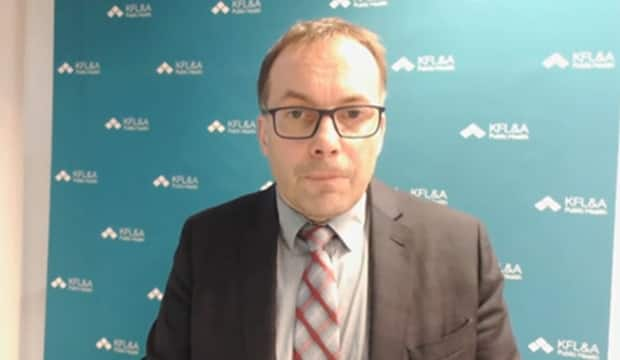Kingston top doc cautiously optimistic, but says hospitalizations remain high

The top doctor in the Kingston, Ont., area says hospitalizations are below the region's peak during the Delta wave — but that doesn't mean residents are out of the woods yet.
In a written statement sent to CBC News on Wednesday, Dr. Piotr Oglaza of Kingston, Frontenac and Lennox & Addington Public Health said if the region's hospitalization rate remains stable over the next two weeks it will be "very reassuring."
But the medical officer of health wouldn't say whether this latest wave created by Omicron has either peaked or plateaued, instead noting hospitalizations remain high.
"[We're] cautiously optimistic, looking at our immunization coverage, that the impact of Omicron will be blunted by the protection against severe illness that vaccination provides," he said.

The health unit confirmed its first case of Omicron on Dec. 8, 2021, before seeing case numbers rapidly explode.
Before the surge, the Kingston area never had more than four local residents hospitalized and three in intensive care units. By Dec. 13, there were 32 and 14 respectively, according to Oglaza.
The Kingston area's hospitalization and ICU figures have gradually come down in recent weeks and stood at 18 and nine on Wednesday, according to the health unit's COVID-19 dashboard.
Most of the health unit's ventilated and ICU patients are long-term hospitalizations from the Delta variant, while 40 per cent of Omicron hospitalizations have been among people 80 years and over.
Dr. Gerald Evans, an infectious disease specialist at Queen's University, said he believed the declining hospitalization and ICU figures, together with the region's active cases, point to a potential plateauing of cases.
Still, he and Oglaza caution that case numbers are less reliable as a measure of COVID-19 now that PCR testing is restricted to high-risk people.
"We're not seeing a decline in cases," Evans said about the region. "But we're not seeing a huge generation of new cases. I think it bodes well because we know from other jurisdictions that Omicron hits hard, rises quickly and then dissipates quickly — a lot quicker than the previous waves with the other variants."
"The good news is our ICU numbers are not really shooting up at all," Evans said.
Kingston mayor Bryan Paterson said there is cautious optimism that "the worst may be behind us."
"But the same time, there have been so many twists and turns along this journey that we have to be prepared for the unexpected," Paterson said. "And I think the last month has been a good illustration of that."
WATCH | Kingston mayor cautiously optimistic its worst of this wave is over:
Paterson said the health unit has shared as much information with the province about its experience.
"Hopefully it's an early indicator for the province about what the rest of that wave [will] look like and how quickly will we turn that corner and how quickly will we descend as well," he said. "We're hoping that we're going to continue to be kind of that early warning system."

 Yahoo Sports
Yahoo Sports 